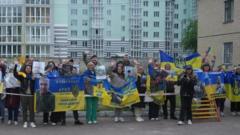Ukraine and Russia are preparing for their largest prisoner swap to date, involving 1,000 individuals from each side, amidst stalled peace discussions. Despite a lack of confirmed details, both nations seem poised to execute this exchange in a few days while the legitimacy of their respective leadership remains under scrutiny.
Major Developments in Ukraine-Russia Prisoner Swap Amid Uncertain Peace Talks

Major Developments in Ukraine-Russia Prisoner Swap Amid Uncertain Peace Talks
A significant prisoner exchange between Ukraine and Russia is on the horizon, with implications for ongoing negotiations and future ceasefire attempts.
Ukraine and Russia are gearing up for a monumental prisoner swap, expected to be the largest since the escalation of conflict began in 2022. Officials from both nations have proposed the exchange of 1,000 prisoners of war each, following a week of delicate peace negotiations in Istanbul that yielded little progress. President Donald Trump congratulated both sides on his social media platform, hinting that this exchange could be a pivotal moment for future diplomatic relations, though no official confirmations have emerged yet.
Reports indicate that the exchange may unfold over a three-day period along the Ukrainian border with Belarus. The agreement for this pivotal swap came during a brief meeting in Turkey, marking the first direct dialogue between Ukraine and Russia since March 2022. While both sides met for a short, two-hour conversation, Russian Foreign Minister Sergei Lavrov subsequently announced intentions for a second round of discussions, citing plans to present a "memorandum" to Ukrainian representatives.
Trump has also suggested that this development could catalyze immediate negotiations toward a ceasefire, following a recent call with Russian President Vladimir Putin. However, Ukrainian President Volodymyr Zelensky countered, accusing Putin of stalling tactics to prolong the conflict. Meanwhile, Italy's Prime Minister Giorgia Meloni has expressed support for the concept of Vatican mediation in the quest for peace, although Lavrov dismissed that option as "realistic."
In light of ongoing tensions, Lavrov reiterated claims questioning the legitimacy of Zelensky's leadership, hinting at the necessity of potential elections before any peace deal could be considered. As discussions unfold, the focus remains on crafting an agreement that ensures a secure and stable resolution to hostilities, yet significant gaps between both nations in direct negotiations persist.





















